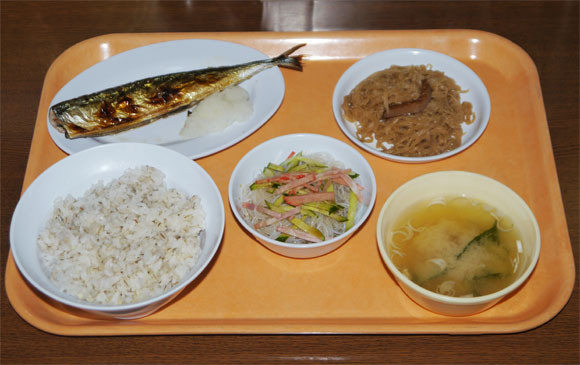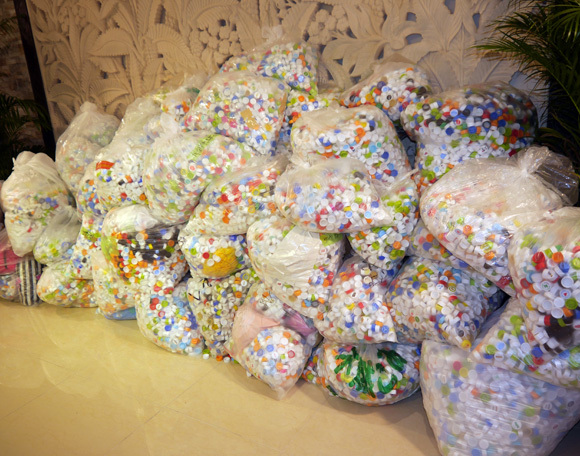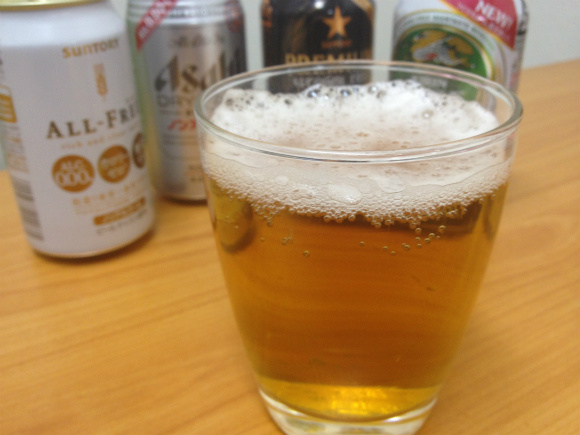On June 10, Japanese underground railway network Tokyo Metro made an official statement about an incident in which a woman, who fell onto the Hibiya subway line at Roppongi station, was mistaken for hand luggage by the employee on duty at the time. Not realizing the full seriousness of the matter, the station employee then gave the go ahead for the train, which was stationary at the platform at the time, to continue forward on to its next destination.
Posted by Andrew Miller (Page 4)
The Kusatsushi Board of Education in Shiga Prefecture, Japan made a public announcement on June 3 that a teacher employed at an elementary school within the Kusatsushi area was being questioned after installing a small, compact-style camera inside the girls’ toilets at the school where he worked.
With photos of people doing unsightly things on public transport and reports of cockroaches floating in smoothies, it’s true that China hasn’t been painted in the best light recently. However, an incident occurring in Egypt has caused outrage both at home and abroad after it was discovered that a Chinese tourist had scrawled a message on a wall in an ancient Egyptian temple.
Without actually getting arrested and being thrust into the confines of a prison cell, there is little if any chance of us being able to taste real prison food. However, this doesn’t stop many of us wondering on the odd occasion what all those guys doing hard labor actually eat day after day. It could possibly be the most revolting thing known to man but if only there were a way to at least try it…. In this vain, our RocketNews24 reporter Kuzo searched high and low for a place where all of us upstanding citizens can try the stuff without resorting to breaking the law. Thankfully, this is Japan, so it didn’t take long for him to track down a cafeteria in northern part of Japan that specializes solely in Japanese prison food.
When a handful of Japan’s wannabe starlets made a plea to their limited fan base to send them as many plastic bottle caps as possible, it was generally assumed that nothing much would come of it. However, imagine our surprise when, keen to see their favorite idols hit the big time, passionate fans stepped up to donate over 100 million caps towards their case.
In Japan, fans with this level of dedication are known as “aidoru otaku”, meaning idol or star fanatics. Their enthusiasm often goes beyond the boundaries of casual fandom and enters into what can only be described as the realms of what some might deem obsessive. Even so, you’ve got to admire their team spirit- that’s an awful lot of drinks to consume!
As a measure to prevent drink driving and to improve people’s health, many Japanese beer manufacturers have released non-alcohol versions of their products, with such products seeing surprisingly strong sales in the marketplace. Since the products on sale contain no alcohol, it is safe to say that there is no fear of the law being broken by underage drinkers enjoying them. In fact, it’s not uncommon to find alcohol-free beer in the soft-drink section of the menu.
Nevertheless, when it comes to minors and the consumption of non-alcohol beer, the exact legalities of it all become rather confusing. The reason being that it is still necessary to show proof of your age when purchasing non-alcohol beverages. So what’s the deal here? Is it really safe for those under age to drink non-alcohol beer? RocketNews24 got to the bottom of it all by speaking to Japan’s top beer manufacturers directly.
Read More
Drivers in China are being left completely dumbfounded as to how to navigate a busy junction without violating the law or getting themselves killed. The reason being that a traffic light installed in one town gives them just one second to pull out before turning back to red.
We hope you have a car with a decent engine.
In Japan, countless numbers of bicycles are abandoned outside stations and on roadsides each year. While many will be turned into scrap metal and recycled, a percentage that are still deemed functional after a few repairs are being put to effective use as a mode of transport for nurses and midwives in developing countries like Ghana.
Japan’s latest tourism offering looks set to capture the attention of both sightseers and locals seeking a spot of adventure. From the Japanese company that embarked on such enterprises as the open air double-decker bus comes the “land and water bus”. The development of the vehicle is part of a new Tokyo sightseeing strategy undertaken by Japanese automobile company “Hinomaru Bus”. The service, dubbed “Sky Duck Tokyo Splash Tour”, launched on March 2013 and has been fully booked since its first day of operation.
In recent years, the use of law-evading hallucinogenic herbs has been becoming more popular among young people in Japan. These herbs have properties similar to those of illegal drugs like cannabis, however due to their synthetic nature, many users fail to see the real dangers lurking behind them. As an initiative to prevent widespread misuse, the government produced a comprehensive list of chemicals that are banned in the sale and use of law-evading hallucinogenic herbs on March 22, 2013. The chemical substances on the list recently rose from 92 to 851. However many shops are selling a modified version of the banned herbs in attempt to evade the issues of legalities and keep profits alive. In this way, it is a cat and mouse game where once one chemical has been outlawed, a similar substance carrying slightly altered chemical properties is quick to make its way on to the market. While effects of inhaling these herbs are similar to hallucinogenic drugs, shopkeepers claim that they are solely for aromatic purposes. Of particular concern is that the number of online law-evading herb shops is also increasing.
Two years after Japan’s great earthquake and the Daiichi nuclear diaster comes a documentary that tells of the citizens who still can’t return home to Iitate Village in Fukushima due to the high levels of radiation.
Over at our sister site, Pouch, film critic Kaori Saito was given the opportunity to check out the film production of “Iitate Village, the Problem of Radiation and Returning Home” (in Japanese “Iitate-mura hoshano to kison”) before it was released to the Japanese public on May 4. Kaori comments that the work deserves particular credit for its delicate treatment of the continuing problem of radiation and the depiction of the struggles of the inhabitants affected.
For the readers who are unfamiliar with Iitate, it is a village that is located 30 kilometers from Fukushima Daiichi nuclear power plant within the prefecture of Fukushima. While it is reasonable to believe that the level of radioactive contamination would be comparatively low for an area this far from the power plant, due to the strong winds, snow and rain that occurred directly following the disaster, the actual levels of contamination far exceeded original estimates. For Japan and Iitate Village, unprecedented levels of radiation poured down, making the land uninhabitable and thus leaving the former residents no alternative but to abandon their village and seek refuge elsewhere.
Read More
According to news correspondence from Wuhan City in China, a Chinese-Korean woman used the internet to befriend a man from China only to discover that on meeting face to face, he fell short of her expectations. The woman then contacted local authorities claiming that she had been “cheated.”
The woman, Ms. Chan (35), who is of Chinese descent but possesses Korean nationality and resides in the city of Suwon, Korea, first made contact with the Chinese man (37) from Wuhan, China, via the Chinese instant messenger software QQ. The man is believed to be employed part-time. After several chat sessions, the couple are said to have hit it off and as a natural course of events, the woman suggested flying over to China to meet in person. However, for one reason or another, the man would always claim to be busy and say that it was difficult for him to take time off from work.
It as been reported that engineers at Japan’s fast breeder reactor plant Monju made a mistake during testing of the plant’s emergency power generator, which subsequently resulted in the release of black smoke and the ringing of the plant’s fire alarm.
An article published in a special edition of Japanese weekly Shukan Bunshu has suggested that potentially hazardous chicken sourced from China may be finding its way into fast food in Japan. The article, composed by writer Shuuji Okuno, begins by posing the following question:
“Would you still be willing to put a chicken nugget in your mouth if you knew the real story? The hazards of China’s domestic chicken meat!”
Our attention well and truly grabbed, we delved inside. Read More
The number of Japanese women who are struggling with food and living expenses is reported to be on the rise. While most women try to increase their earnings by taking on an extra part time job or even changing occupations completely, there are others who resort to some rather unscrupulous methods. One such method is to use interactive smartphone games to trick men into buying them dinner to reduce the burden of their food costs.
All the men out there, brace yourselves as what is about to unfold will leave you squirming!
According to an AFP report dated 16 April, 2013, Korean electronics company Samsung hired Taiwanese university students to publish slanderous articles on the internet about Taiwanese smart phone manufacturer HTC. Taiwan’s Fair Trade Commission is currently investigating the matter and there are already reports that Samsung is admitting outright to the misconduct in its marketing strategies.
After careful deliberation, if Taiwan’s Fair Trade Committee deem Samsung’s most recent stealth marketing strategy to be illegal, it will mean Samsung paying a US$835,000 penalty.
A thesis which assesses the risks of internal radiation exposure within Fukushima Prefecture following the explosions at the Daiichi Nuclear Power Plant, suggests that the effects of internal radiation fall far below that recorded after Chernobyl.
Ryugo Hayano, who works as a professor at Tokyo University’s Science Research Department, has collected the findings of doctors who conducted research into internal radiation exposure among those living inside of the Fukushima Prefecture. He consolidated these findings into an English journal entitled ‘Proceedings of Japan Academy Series B89’, which is available on the net.
The latest journal is a collection of reports that looks at the degree of radiation exposure through daily food consumption and it is reported to be the first of its kind.
On April 10, the mayor of Kyoto Keiji Yamada made public his intentions to appeal to the government to award overseas students who graduate from Kyoto University with the right to permanent residence. It is a proposal entitled ‘Kyoto University Special Ward’ and also incorporates other supportive measures for foreign students. With a decrease in student intake within Japan in recent years, it is hoped that by providing incentives for academically skilled overseas students, Kyoto will not only be able to compete with other cities like Tokyo but will also be able to add a new lease of life to its cultural city.
In the past decade or so, the widespread use of computers in both the public and private sphere has seen the personal computer become an indispensable part of our daily lives. Whether it be creating a chart of company expenditures or simply recording important appointments in a software-based diary, almost all of our work has been a layer of digital varnish. The birth of the laptop computer has meant that work can be done virtually anywhere, with a wealth of information available in a few clicks and taps of the keyboard. As wonderful as all this is, it’s easy to overlook some of the problems that arise from a computer-centric life. Here we’ll take a good, hard look at the downside to spending the vast majority of our day plugging in and screen-facing.





 Survey finds that one in five high schoolers don’t know who music legend Masaharu Fukuyama is
Survey finds that one in five high schoolers don’t know who music legend Masaharu Fukuyama is Skyscraper sized Pokémon cards to appear in Tokyo all year long in Tocho projection mapping event
Skyscraper sized Pokémon cards to appear in Tokyo all year long in Tocho projection mapping event What’s the best way to spend 1,000 yen at Kura Sushi?【Japan Super Budget Dining】
What’s the best way to spend 1,000 yen at Kura Sushi?【Japan Super Budget Dining】 Yakuzen ramen restaurant in Tokyo is very different to a yakuza ramen restaurant
Yakuzen ramen restaurant in Tokyo is very different to a yakuza ramen restaurant Tokyo Skytree turns pink for the cherry blossom season
Tokyo Skytree turns pink for the cherry blossom season The 10 most annoying things foreign tourists do on Japanese trains, according to locals
The 10 most annoying things foreign tourists do on Japanese trains, according to locals Starbucks Japan releases new sakura goods and drinkware for cherry blossom season 2026
Starbucks Japan releases new sakura goods and drinkware for cherry blossom season 2026 Host club royalty Roland demonstrates his night-time routine, claims it’s not dissimilar to yours
Host club royalty Roland demonstrates his night-time routine, claims it’s not dissimilar to yours Japanese potato chip Rubik’s Cubes coming soon
Japanese potato chip Rubik’s Cubes coming soon Naruto and Converse team up for new line of shinobi sneakers[Photos]
Naruto and Converse team up for new line of shinobi sneakers[Photos] Is Sapporio’s Snow Festival awesome enough to be worth visiting even if you hate the snow? [Pics]
Is Sapporio’s Snow Festival awesome enough to be worth visiting even if you hate the snow? [Pics] Japan has trams that say “sorry” while they ride around town…but why?
Japan has trams that say “sorry” while they ride around town…but why? Sakura Totoro is here to get spring started early with adorable pouches and plushies
Sakura Totoro is here to get spring started early with adorable pouches and plushies Starbucks Japan unveils new sakura Frappuccino for cherry blossom season 2026
Starbucks Japan unveils new sakura Frappuccino for cherry blossom season 2026 Poop is in full bloom at the Unko Museums for cherry blossom season
Poop is in full bloom at the Unko Museums for cherry blossom season Now is the time to visit one of Tokyo’s best off-the-beaten-path plum blossom gardens
Now is the time to visit one of Tokyo’s best off-the-beaten-path plum blossom gardens Playing Switch 2 games with just one hand is possible thanks to Japanese peripheral maker
Playing Switch 2 games with just one hand is possible thanks to Japanese peripheral maker Japan’s newest Shinkansen has no seats…or passengers [Video]
Japan’s newest Shinkansen has no seats…or passengers [Video] Foreigners accounting for over 80 percent of off-course skiers needing rescue in Japan’s Hokkaido
Foreigners accounting for over 80 percent of off-course skiers needing rescue in Japan’s Hokkaido Super-salty pizza sends six kids to the hospital in Japan, linguistics blamed
Super-salty pizza sends six kids to the hospital in Japan, linguistics blamed Foreign tourists in Japan will get free Shinkansen tickets to promote regional tourism
Foreign tourists in Japan will get free Shinkansen tickets to promote regional tourism Take a trip to Japan’s Dododo Land, the most irritating place on Earth
Take a trip to Japan’s Dododo Land, the most irritating place on Earth Archfiend Hello Kitty appears as Sanrio launches new team-up with Yu-Gi-Oh【Pics】
Archfiend Hello Kitty appears as Sanrio launches new team-up with Yu-Gi-Oh【Pics】 Survey asks foreign tourists what bothered them in Japan, more than half gave same answer
Survey asks foreign tourists what bothered them in Japan, more than half gave same answer Japan’s human washing machines will go on sale to general public, demos to be held in Tokyo
Japan’s human washing machines will go on sale to general public, demos to be held in Tokyo Starbucks Japan releases new drinkware and goods for Valentine’s Day
Starbucks Japan releases new drinkware and goods for Valentine’s Day We deeply regret going into this tunnel on our walk in the mountains of Japan
We deeply regret going into this tunnel on our walk in the mountains of Japan Studio Ghibli releases Kodama forest spirits from Princess Mononoke to light up your home
Studio Ghibli releases Kodama forest spirits from Princess Mononoke to light up your home Major Japanese hotel chain says reservations via overseas booking sites may not be valid
Major Japanese hotel chain says reservations via overseas booking sites may not be valid Put sesame oil in your coffee? Japanese maker says it’s the best way to start your day【Taste test】
Put sesame oil in your coffee? Japanese maker says it’s the best way to start your day【Taste test】 No more using real katana for tourism activities, Japan’s National Police Agency says
No more using real katana for tourism activities, Japan’s National Police Agency says The 10 most annoying things foreign tourists do on Japanese trains, according to locals
The 10 most annoying things foreign tourists do on Japanese trains, according to locals Starbucks Japan releases new sakura goods and drinkware for cherry blossom season 2026
Starbucks Japan releases new sakura goods and drinkware for cherry blossom season 2026 Host club royalty Roland demonstrates his night-time routine, claims it’s not dissimilar to yours
Host club royalty Roland demonstrates his night-time routine, claims it’s not dissimilar to yours Japanese potato chip Rubik’s Cubes coming soon
Japanese potato chip Rubik’s Cubes coming soon Naruto and Converse team up for new line of shinobi sneakers[Photos]
Naruto and Converse team up for new line of shinobi sneakers[Photos] 10 vegetarian foods you can order at almost any Japanese restaurant
10 vegetarian foods you can order at almost any Japanese restaurant Larger than life Doraemon doll will delight fans, terrify pets and small children
Larger than life Doraemon doll will delight fans, terrify pets and small children Kyoto’s “ikezu” culture of backhanded compliments explained in hilarious souvenir sticker series
Kyoto’s “ikezu” culture of backhanded compliments explained in hilarious souvenir sticker series Saitama is home to the best strawberries in Japan that you’ve probably never even heard of
Saitama is home to the best strawberries in Japan that you’ve probably never even heard of Hey, 2020s kids! The ’90s have a sticker picture message waiting for you in Tokyo
Hey, 2020s kids! The ’90s have a sticker picture message waiting for you in Tokyo Chinese classroom introduces roller coaster-style desks, hopes to protect kids’ eyesight
Chinese classroom introduces roller coaster-style desks, hopes to protect kids’ eyesight The etiquette rules for visiting Shinto shrines in Japan
The etiquette rules for visiting Shinto shrines in Japan If you haven’t tried an antenna shop in Japan, you’re missing out
If you haven’t tried an antenna shop in Japan, you’re missing out